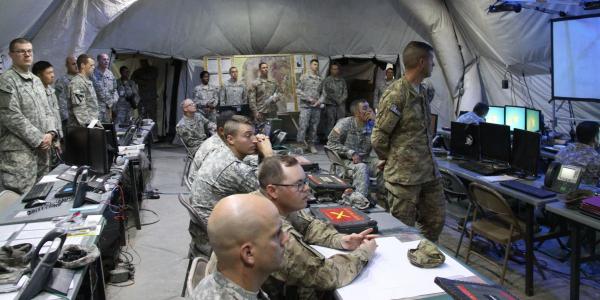Simplicity: The Most Overlooked Principle of Warfare
Lt. Gen. Paul Funk II, USA, the commander of III Corps, which is preparing for war, called for a network with simplicity as a core requirement.
LTG Funk, @IIICorps_CG I'm looking for a simple solution that allows me to bring the power of the nation to bear and win.#AFCEATechNet
— George Seffers (@gseffers) August 8, 2017
“The most often overlooked principle of war is simplicity, to tell you the truth,” Gen. Funk told the AFCEA TechNet Augusta audience in Augusta, Georgia. “When everybody’s tired, cold, wet and thirsty, in a contested battlefield across multiple operations, our systems simply have to integrate. It has to be easy for the signal soldier to do that. If you have to have a Ph.D. to operate something, that’s not effective,” the commander said.
He added that if it takes 72 hours to put up a command post and integrate all the different capabilities, such as voice and data, that also is not effective. The systems must integrate quickly, and must move “from domain to domain and environment to environment.”
LTG Funk, @IIICorps_CG, I think a defensive choice ought to be change faster than our adversary. #AFCEATechNet
— George Seffers (@gseffers) August 8, 2017
When asked what he would like to see in a network, Gen. Funk raised the simplicity issue again. “I need solutions that are simple and intuitive and do not require field service reps, to be very blunt,” he said.
He drew laughter when he added that warfighters are working in a “degraded environment” most of the time because of the complexity of the network.
On a more sober note, he described the modern battlefield as incredibly lethal. “We’re talking battalions of motorized forces destroyed in three minutes,” he added.
Gen. Funk acknowledged the complexity of providing simplicity on the battlefield by pointing out there is some science involved. “But at the end of the day, if you ask me what I want, I want a simple system that allows me to bring the power of the nation to bear to defeat an enemy. That’s what I’m looking for,” he said. “If I can talk, I can win. That’s the way I look at it.”
The commander painted a picture of a warfighter with a handset able to call forth the power of the nation when needed. “Five years from now, we may all be carrying around cellphones, or some sort of device, with a chip that we change out every day that has all kinds of different multispectrum capabilities that the enemy can’t keep up with. That would be okay, too,” he added. “We just gotta remember that when we put it in the hands of our great troopers, they’ll find a way to use it effectively. We just gotta get it to them a little quicker.”





Comments